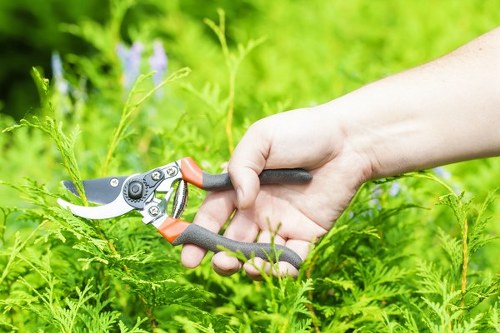Comprehensive Guide to Garden Maintenance in Bayswater

Maintaining a beautiful garden in Bayswater requires careful planning, regular upkeep, and a good understanding of the local climate and soil conditions. Whether you're a seasoned gardener or a beginner, keeping your outdoor space thriving involves various tasks that ensure your plants remain healthy and your garden stays picturesque throughout the year.
First and foremost, understanding the specific needs of your garden is crucial. Bayswater's climate can influence the types of plants that will thrive in your garden. Selecting native plants or those well-suited to the area can significantly reduce maintenance efforts and increase the resilience of your garden against local pests and diseases.
Another essential aspect of garden maintenance is proper watering. Overwatering or underwatering can both be detrimental to plant health. Implementing an efficient irrigation system and understanding the watering needs of your specific plant varieties can help maintain optimal soil moisture levels.

Seasonal Garden Maintenance Tips
Adapting your garden maintenance routine to the changing seasons is vital for sustained plant health and vibrancy. Each season presents unique challenges and opportunities for your garden.
Spring
Spring is a time of renewal, making it the perfect season to prepare your garden for the growing months ahead. Start by cleaning up any debris left over from the winter months. Prune dead branches, remove old mulch, and fertilize your plants to encourage new growth.
Planting new flowers and shrubs during spring can set the foundation for a colorful and thriving garden. Additionally, checking your irrigation system for any issues ensures that your plants receive adequate water as they begin to grow.

Summer
Summer brings warmth and longer daylight hours, which can accelerate plant growth. During this season, focus on regular watering, especially for newly planted seeds and seedlings. Mulching can help retain soil moisture and regulate soil temperature, reducing the need for frequent watering.
Pest control becomes more critical in summer as insect activity increases. Regularly inspect your plants for signs of pests and diseases, and take appropriate measures to protect your garden without harming beneficial insects.

Autumn
Autumn is an ideal time to prepare your garden for the colder months ahead. Remove spent plants and dead foliage to prevent pests and diseases from overwintering. This season is also perfect for planting bulbs that will bloom in the spring, ensuring a burst of color when the weather warms up again.
Composting fallen leaves and other organic matter enriches your soil, providing essential nutrients for your plants. Additionally, pruning certain shrubs and trees in autumn can promote healthier growth in the following year.

Winter
Winter may seem like a dormant period for your garden, but proper maintenance during this time is essential. Protect sensitive plants by covering them with mulch or frost cloths to shield them from extreme cold and frost damage.
It's also a good time to plan for the next gardening season. Assess what worked well and what didn't, and start designing new garden layouts or selecting new plant varieties that you wish to introduce.
Essential Garden Maintenance Tasks
Regular garden maintenance involves a variety of tasks that keep your garden healthy and visually appealing. Below are some essential tasks every Bayswater gardener should incorporate into their routine:
- Weeding: Regularly removing weeds prevents them from competing with your plants for nutrients and water.
- Pruning: Proper pruning encourages healthy growth and maintains the shape and size of your plants.
- Mulching: Applying mulch conserves soil moisture, suppresses weeds, and adds aesthetic value to your garden.
- Fertilizing: Providing your plants with the right nutrients ensures vigorous growth and vibrant blooms.
- Irrigation Management: Ensuring your garden receives adequate water without overwatering is crucial for plant health.
Choosing the Right Plants for Bayswater Gardens
Selecting plants that are well-suited to Bayswater's climate and soil conditions can significantly reduce maintenance efforts and enhance the beauty of your garden. Here are some tips for choosing the right plants:
Native Plants
Native plants are adapted to the local environment, making them more resilient to pests, diseases, and varying weather conditions. Incorporating native species into your garden supports local biodiversity and requires less maintenance.
Drought-Tolerant Varieties
With water conservation becoming increasingly important, drought-tolerant plants are an excellent choice for Bayswater gardens. These plants require less frequent watering and are better suited to withstand dry periods.
- Lavender: Known for its fragrant flowers and ability to thrive in dry conditions.
- Sedum: A hardy succulent that comes in various colors and shapes.
- Yucca: Adds architectural interest and requires minimal water.
Implementing Sustainable Garden Practices
Embracing sustainable practices not only benefits the environment but also enhances the long-term health of your garden. Here are some sustainable garden maintenance tips for Bayswater:
Composting
Composting organic waste such as kitchen scraps, leaves, and grass clippings turns them into nutrient-rich soil amendments. This reduces landfill waste and provides a natural fertilizer for your plants.
Rainwater Harvesting
Collecting rainwater through barrels or other systems allows you to use natural water sources for irrigation, reducing reliance on municipal water and conserving water resources.
- Benefits: Saves money on water bills and provides plants with naturally soft water.
- How to Start: Install a rain barrel beneath a downspout to collect runoff from your roof.
Pest and Disease Management
Protecting your garden from pests and diseases is crucial for maintaining healthy plants. Integrated Pest Management (IPM) is an effective approach that combines various strategies to control pests with minimal environmental impact.
Biological Controls
Encouraging beneficial insects such as ladybugs and praying mantises can naturally reduce pest populations. These predators help keep harmful insect numbers in check without the need for chemical interventions.
Organic Pesticides
If pest problems become severe, opting for organic pesticides ensures that you manage pests without causing harm to the broader ecosystem. Always follow label instructions to minimize any unintended effects.
Lawn Care in Bayswater
A lush, green lawn can be the centerpiece of your garden. Proper lawn care involves several maintenance tasks that promote healthy grass growth and prevent common lawn problems.
Regular Mowing
Mowing your lawn at the correct height encourages strong root development and keeps your grass looking neat. Avoid cutting more than one-third of the grass blade at a time to prevent stress to the plants.
Aeration
Aerating your lawn improves soil compaction, allowing air, water, and nutrients to penetrate the soil more effectively. This leads to healthier grass and a more resilient lawn.
- When to Aerate: Best done during the growing season when grass can recover quickly.
- How to Aerate: Use a manual or mechanical aerator to create holes in the lawn.
Hardscaping and Garden Structures
Incorporating hardscaping elements such as pathways, patios, and garden structures can enhance the functionality and aesthetics of your garden. Proper maintenance of these features ensures their longevity and appearance.
Pathways and Patios
Regular cleaning and sealing of pathways and patios prevent moss buildup and surface deterioration. Repair any cracks or uneven areas to maintain safety and visual appeal.
Garden Structures
Structures like pergolas, sheds, and gazebos add character to your garden. Periodic inspections and maintenance, such as repainting or treating wood, help preserve these additions.
Hiring Professional Garden Maintenance Services
While DIY garden maintenance can be fulfilling, there are instances where hiring professional services in Bayswater can save time and ensure optimal results. Professional gardeners bring expertise, experience, and specialized equipment to handle complex tasks efficiently.
Benefits of Professional Services
- Expertise: Professionals have extensive knowledge of plant care, pest management, and landscape design.
- Time-Saving: Hiring experts allows you to focus on other priorities while ensuring your garden is well-maintained.
- Customized Care: Professionals can tailor maintenance plans to meet the specific needs of your garden.
If you're considering professional assistance, ensure you choose a reputable garden maintenance service in Bayswater that aligns with your garden's needs and your personal preferences.
Tools and Equipment for Effective Garden Maintenance
Having the right tools and equipment is essential for efficient garden maintenance. Investing in quality tools not only makes tasks easier but also ensures better results.
Essential Tools
- Pruners: For trimming and shaping plants.
- Shovels and Spades: For digging and planting.
- Rakes: For gathering leaves and leveling soil.
- Hoses and Sprinklers: For effective watering.
- Lawn Mower: For maintaining a neat lawn.
Regularly maintaining your tools, such as cleaning and sharpening blades, ensures they remain effective and prolongs their lifespan.
Advanced Equipment
For larger gardens, investing in advanced equipment like rototillers, leaf blowers, and tractors can significantly reduce manual labor and increase efficiency.
Creating a Maintenance Schedule
Organizing your garden maintenance tasks into a schedule helps ensure that all necessary activities are performed in a timely manner. A well-planned schedule promotes consistency and prevents tasks from being overlooked.
Monthly Tasks
- Check for pests and diseases.
- Prune overgrown branches.
- Fertilize plants as needed.
- Inspect irrigation systems for leaks.
Seasonal Tasks
- Spring: Plant new flowers, clean up garden beds.
- Summer: Mulch beds, manage watering schedules.
- Autumn: Rake leaves, prepare soil for winter.
- Winter: Protect sensitive plants, plan for next season.
Using a calendar or garden planner can help you keep track of these tasks and ensure that your garden remains in top condition year-round.
Enhancing Garden Aesthetics
Aesthetics play a significant role in garden maintenance. Creating visually appealing landscapes involves careful consideration of plant arrangement, color schemes, and garden features.
Plant Arrangement
Arrange plants based on their size, color, and light requirements. Taller plants can serve as focal points, while smaller plants can fill in gaps and add texture. Grouping plants with similar needs together simplifies maintenance and creates a harmonious look.
Color Schemes
Choosing a cohesive color palette enhances the visual appeal of your garden. Complementary colors can create striking contrasts, while analogous colors provide a more subtle and soothing effect.
- Monochromatic Schemes: Use variations of a single color for a unified and elegant look.
- Complementary Schemes: Pair colors that are opposite on the color wheel for vibrant and dynamic displays.
- Analogous Schemes: Combine colors that are next to each other on the color wheel for a harmonious and cohesive appearance.
Maintaining Garden Health
Ensuring the overall health of your garden involves proactive measures to prevent issues and address them promptly when they arise.
Soil Health
Healthy soil is the foundation of a thriving garden. Regularly testing your soil helps identify nutrient deficiencies or pH imbalances. Amending the soil with organic matter like compost or manure improves its structure and fertility.
Water Management
Proper water management prevents issues like root rot and fungal diseases. Ensure that your garden has proper drainage and avoid overwatering. Using mulch can help retain soil moisture and reduce evaporation.
- Tip: Water your garden early in the morning to minimize evaporation and allow plants to absorb moisture throughout the day.
Dealing with Common Garden Challenges
Gardening comes with its set of challenges, but with the right strategies, you can overcome them effectively.
Weeds
Weeds compete with your plants for resources and can quickly take over a garden if not managed. Regular weeding, applying mulch, and using landscape fabric are effective ways to control weed growth.
Pests
Common garden pests like aphids, slugs, and caterpillars can damage plants. Monitoring your garden regularly and implementing Integrated Pest Management (IPM) practices can help keep pest populations under control.
- Natural Remedies: Use neem oil or insecticidal soaps to treat pest infestations without harming beneficial insects.
- Physical Barriers: Install fences or row covers to protect plants from larger pests like rabbits or deer.
Diseases
Fungal and bacterial diseases can weaken or kill your plants. Preventative measures like proper spacing, adequate ventilation, and avoiding overhead watering can reduce the risk of disease. Remove and dispose of affected plants to prevent the spread of pathogens.
Gardening for Sustainability
Sustainable gardening practices contribute to environmental conservation and create a more resilient garden ecosystem. Here are some ways to make your garden more sustainable:
Use of Native Plants
As mentioned earlier, native plants are adapted to the local environment and require fewer resources to thrive. They also support local wildlife, including pollinators like bees and butterflies.
Reducing Chemical Use
Minimizing the use of chemical fertilizers and pesticides protects beneficial organisms and prevents soil and water contamination. Opt for organic alternatives and natural pest control methods whenever possible.
- Organic Fertilizers: Compost, fish emulsion, and bone meal are excellent sources of nutrients for plants.
- Natural Pest Control: Encourage predator insects and use biological controls to manage pest populations.
Maximizing Garden Efficiency
Efficiency in garden maintenance saves time and resources while ensuring your garden remains healthy and beautiful.
Smart Irrigation Systems
Installing smart irrigation systems with timers and moisture sensors optimizes water usage. These systems adjust watering schedules based on weather conditions and soil moisture levels, ensuring plants receive the right amount of water.
Vertical Gardening
Vertical gardening maximizes space, especially in smaller gardens. Using trellises, wall-mounted planters, and hanging baskets can add depth and interest to your garden without taking up valuable ground space.
- Benefits: Increases planting area, improves air circulation, and makes harvesting easier.
- Tips: Choose plants that are well-suited for vertical growth, such as climbing herbs, flowers, and vegetables.
Conclusion: Achieving a Thriving Garden in Bayswater
Effective garden maintenance in Bayswater involves a combination of regular upkeep, informed plant selection, sustainable practices, and efficient resource management. By understanding the unique requirements of your garden and implementing these strategies, you can create a vibrant and resilient outdoor space that brings joy and tranquility throughout the year.
Whether you choose to maintain your garden yourself or enlist the help of professional services, dedication and consistent care are the keys to success. Embrace the beauty of gardening and enjoy the numerous benefits it offers, from enhancing your home's curb appeal to providing a peaceful retreat for relaxation.
Contact us today to learn more about our garden maintenance services in Bayswater and let us help you transform your garden into a stunning oasis.
